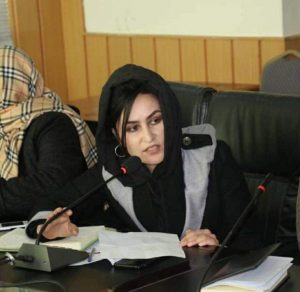Peace can eliminate gender discrimination

Gender discrimination has always been discussed as one of the serious social problems, especially for women. Women in various provinces, including Badakhshan, see this phenomenon as a barrier to their social activities and believe that the problem will be partially resolved after peace agreements.
“Gender discrimination is one of the biggest concerns for every woman in Afghanistan and is rooted in society,” said Elena Ghiasi in an interview with the CSHRN. “Currently, there exist sexual attitudes towards women, and the possible peace agreement will be political and social, in which case these problems will be partially eliminated.”
CSHRN: Where do you think the root of this problem is?
Ghiasi: These problems take its roots from family, and then it expands in the society; restrictions in families are imposed by husband, father, or brother. In the absence of these restrictions, however, even women who lack the necessary confidence can participate in training to strengthen their self-confidence and put their abilities to use. According to Ms Ghiasi, women in this province are mostly employed in the handicrafts, livestock and agriculture sectors.
CSHRN: What other problems do women in Badakhshan have?
Ghiasi: The presence of armed opposition in rural areas has been challenging and violating women’s rights. Although better than before another problem is the access to welfare facilities, which is more concentrated in the urban areas and women in the rural areas have not been provided with sufficient services.
CSHRN: You mentioned that with the accomplishment of peace, women’s problems will be solved to some extent, however, what are the women’s concerns about the outcome of the peace talks?
Ghiasi: Women are concerned about retreating to the past and losing their achievements of the past two decades. They are worried that the role of women in various fields will be ignored.
According to Ms Ghiasi, the existence of women in different sectors and the use of their views is very valuable, and ignoring them will not lead to sustainable peace. It must be acknowledged that the presence of women in negotiations affects its quality.
CSHRN: Do you think that the number of women in the negotiation team is enough?
Ghiasi: Their number is by no means satisfactory. Women from different groups should be present to defend various aspects of their rights.
According to Ms Ghiasi, women are one of the influential factors in the society, therefore their presence in peace talks plays an important role.
Ms Ghiasi says having a prosperous society away from social concerns is the definition of peace, and what Badakhshan women expect from peace talks is to put an end to social and cultural problems.